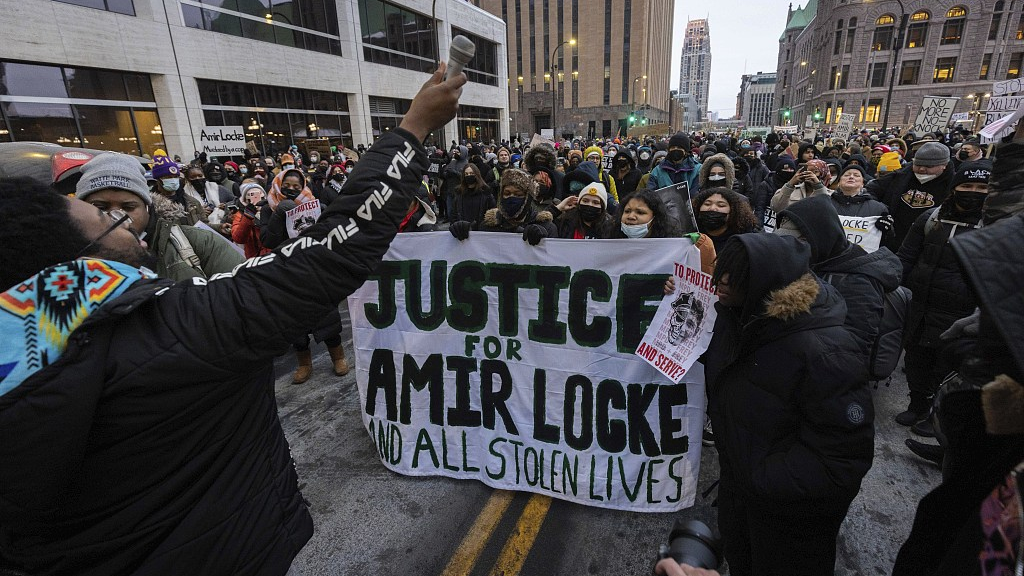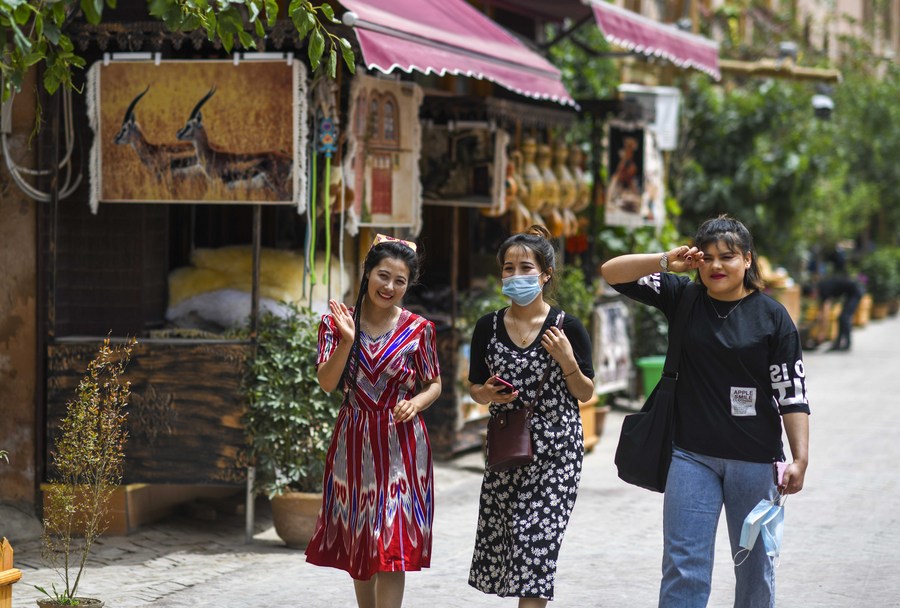
People march at a rally to protest the fatal police shooting of young Black man Amir Locke in Minneapolis, Minnesota, the U.S., February 5, 2022. /CFP
People march at a rally to protest the fatal police shooting of young Black man Amir Locke in Minneapolis, Minnesota, the U.S., February 5, 2022. /CFP
Editor's note: Stephen Ndegwa is a Nairobi-based communication expert, lecturer-scholar at the United States International University-Africa, author and international affairs columnist. The article reflects the author's opinions and not necessarily the views of CGTN.
The release of the United States "2021 Country Reports on Human Rights Practices" on April 12 has reopened old wounds inflicted by the superpower around the world in its perennial quest to be the world's policeman. Basically, the solemn report is a litany of human suffering covering 198 countries and territories. Well, apart from the U.S. itself.
The U.S. lacks the wisdom of introspection, which makes it keep going even when it is clearly off the railings. What is lacking in the report is the story of how the superpower has contributed to global injustices, either directly or indirectly. For instance, it does not explain how capitalism has created a cruel world where only the fittest are meant to survive, where the end justifies the means no matter how gross.
Experts say that it is not possible for the U.S. to have empathy for the suffering of human beings in other countries. The report is really not about protecting humanity, but is a carrot and stick strategy that rewards those that toe the line without contestation, and arm twists those that decide to chart their own destiny without undue influence.
Unfortunately, it seems the United Nations (UN) has abrogated its role of human rights policing, a responsibility given to the UN Human Rights Council (UNHRC). The body is responsible for promoting and protecting human rights around the world. As stated in its mandate, the body investigates allegations of breaches of human rights in UN member states and addresses thematic human rights issues like freedom of association and assembly, freedom of expression, freedom of belief and religion, etc.
For the 2022 human rights report, the UNHRC should undertake its own investigations with an open mind and without preconceived narratives. It should avoid stereotypes that the West condescendingly holds against other societies, which are usually far removed from the reality on the ground. There is a difference between framing an issue as fault-finding on one hand, and a fact-finding mission on the other. The former seeks wrongs and weaknesses, while the latter searches for facts and information.

Local residents walk in a street at a scenic spot in the ancient city of Kashgar, northwest China's Xinjiang Uygur Autonomous Region, May 16, 2020. /Xinhua
Local residents walk in a street at a scenic spot in the ancient city of Kashgar, northwest China's Xinjiang Uygur Autonomous Region, May 16, 2020. /Xinhua
For instance, to establish claims about alleged human rights abuses in China's Xinjiang Uygur Autonomous Region, a visit by the UNHRC would be significant. As the premier international body that arbitrates conflicts, it is well placed to juxtapose what is happening in Xinjiang against the massive U.S.-led misinformation campaign. Some of the UN themes that should form the framework of a Xinjiang mission include the right to self-determination, the right to anti-racism, the right to development and, economic, social and cultural rights.
Any credible investigation should undertake thorough background research into Xinjiang's history, the socio-economic and cultural nuances of the Uygurs and the other Chinese people as a whole. For instance, claims of forced labor in a community that values hard work is stretching it. This is not to be mistaken with the U.S. rat race that "forces" a majority of its citizens to work inordinately long hours just to survive.
To get in the right frame of mind, the UNHRC should be cognizant of the fact that during the re-education or de-radicalization campaign of the Uygurs in the last five years, Xinjiang has recorded massive gains in the region's economic growth and social cohesion. This has led to the eradication of terrorist activities, achieving one of the major outcomes of the program.
Well, etiquette demands that if someone invites you to their house, there are some basic rules that you should adhere to. Accordingly, you may not demand to get into the bedroom and use dirty linen as evidence of one's uncleanliness. That is akin to laying blame on a universal phenomenon.
The U.S. report needs to desegregate findings rather than nit pick issues, many of which are irrelevant to the socio-economic settings of many countries. For example, theft of public revenue is one of the worst human rights abuses in developing countries. Individuals or organizations who deny public services to millions of people through theft commit grievous crimes. Dilapidated roads result in high road carnage due to an increase of road accidents. Similarly, lack of drugs in public health facilities can lead to a high mortality rate, particularly that of children and other vulnerable demographics.
The annual U.S. human rights report is basically a smokescreen aimed at exonerating the superpower from culpability of a world gone awry. As the Chinese Foreign Ministry spokesperson Zhao Lijian said on Wednesday in a regular press briefing, the U.S. government has been using the so-called human rights reports to defame other countries every year in order to portray itself as a human rights benchmark.
For these U.S. reports to be trusted in the future, the country must prove to the rest of the world how well or equally it treats its minorities and other vulnerable groups. Just as Zhao's words, it must not use the reports as "fig leaves" to cover the nakedness of its ugly domestic human rights record.
(If you want to contribute and have specific expertise, please contact us at opinions@cgtn.com. Follow @thouse_opinions on Twitter to discover the latest commentaries on CGTN Opinion Section.)

